
All vitamins and minerals have crucial roles to play in our overall health. While we mostly focus on getting our recommended daily intake of other vitamins, the importance of vitamin E is often forgotten.
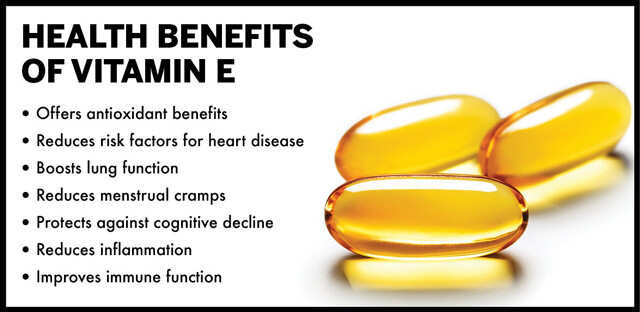
Vitamin E is a fat-soluble vitamin. It is found in a range of foods and is required for the proper functioning of several organs. Read on to know more about this nutrient, its food sources, and how it helps your body.
Nutrition Source
Benefits
Health Benefits
Signs Of Deficiency
Enough?
Frequently Asked Questions:
Nutrition Source
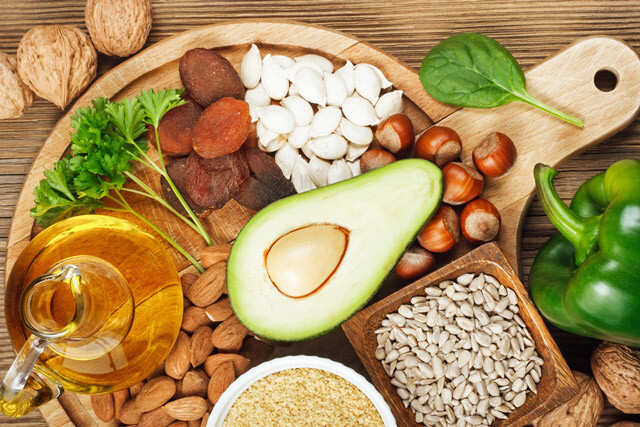
Add the below foods that are abundant in vitamin E to your daily diet.
- Sunflower Seeds: Snack on roasted and salted sunflower seeds or add them to cakes and cookies while baking. You can also add them to yoghurt, salads, parfaits, and oatmeal.
- Almonds: Another great item to snack on, these can also be added to baked goodies and cereal. If you’re a vegan, you can add almond milk to your diet. Almonds are also a good source of protein.
- Wheatgerm Oil: Obtained from the center of the wheat kernel, this oil is rich in vitamins A, B, and D along with vitamin E.

Image: Shutterstock
- Peanuts: Avoid salted and flavoured peanuts; go for plain roasted ones instead.
- Rice Bran Oil: This oil is extracted from chaff or rice husk, which is the hard outer brown layer. It has a high smoke point and mild flavour, so it is ideal for stir-fries, and as an addition to soups and dressings.
- Avocado: The best thing about avocados is that they contain little sugar and are packed with healthy fats. You can also get a healthy dose of vitamin E from this delicious fruit. Eat on toast with a drizzle of olive oil and a sprinkling of sesame seeds or in salads.
- Spinach: In addition to being a good source of vitamin E, this dark leafy green is a powerhouse of nutrients, particularly iron. Add crackling spinach to soups or eat fresh in salads.
The below infographic shows the amount of vitamin E present in different foods.
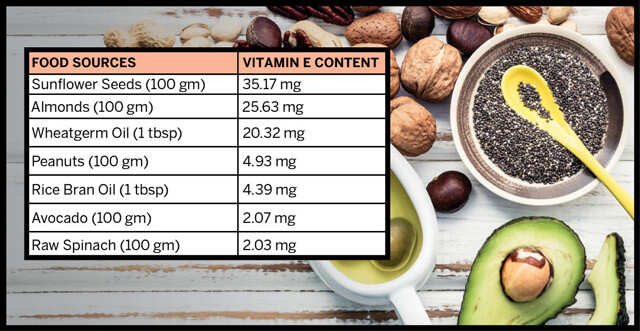
Tip: Note that vitamin E is a fat-soluble vitamin, which means it is absorbed by the body along with fats in the diet. As long as you eat fatty sources of vitamin E like nuts, avocado, and oils, you don't have to worry about the vitamin being absorbed by your body. However, if you're eating vegetables and fruits like butternut squash, spinach, mango, etc., ensure vitamin E absorption by eating a bit of healthy fat.
Benefits
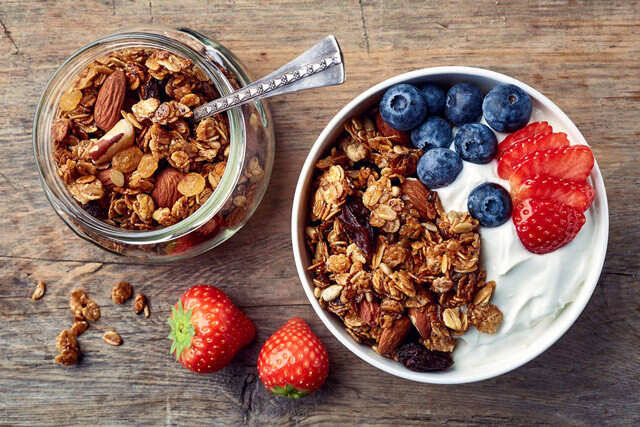
Vitamin E is an antioxidant, which fights against the harmful effects of free radicals in the body. Check out the many health benefits offered by this wonder nutrient:
- Research suggests that vitamin E may reduce risk factors for heart disease such as high blood pressure and cholesterol.
- Vitamin E can contribute to better lung function and improve certain symptoms of asthma in children and adults.
- Vitamin E may help reduce menstrual cramps and pelvic pain in women with dysmenorrhea or endometriosis.
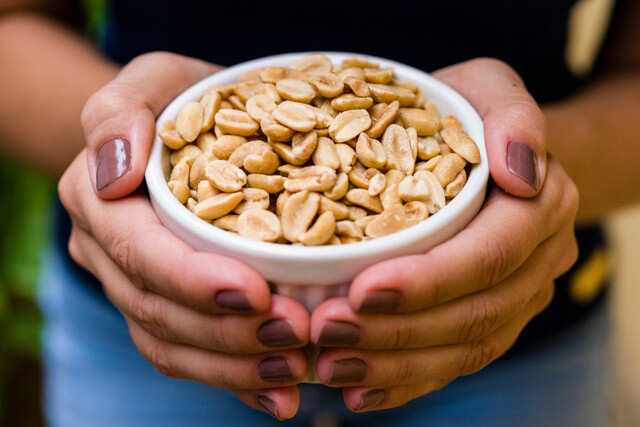
- Non-alcoholic fatty liver disease, which is the accumulation of fat in the liver of people who drink little to no alcohol, can be improved with vitamin E.
- Studies show that maintaining vitamin E levels may protect against cognitive decline.
- In older adults, vitamin E can reduce inflammation and improve immune function.
Tip: Upgrade your diet to get your daily dose of vitamin E from food or turn to supplements.
Health Benefits

Vitamin E also has immense benefits to offer when applied topically. Use vitamin E oil or gel to:
- Moisturise skin
- Promote wound healing
- Prevent sunburn
- Reduce skin itching
- Soothe skin
- Relieve symptoms of eczema and psoriasis
- Minimise the appearance of scars
- Diminish fine lines and wrinkles
- Promote nail health
- Boost scalp health
- Reduce hair fall and maintain hair growth
Tip: Use vitamin E in DIY face packs or hair masks with other natural ingredients for best results.
Signs Of Deficiency

Vitamin E occurs naturally in a variety of foods, so it's unlikely that you'll have a deficiency of this nutrient. Vitamin E deficiency is often the result of an underlying health condition or certain genetic disorders.
Symptoms of vitamin E deficiency are as follows:
- Difficulty in walking or coordination
- Weakness or muscle pain
- Visual disturbances
- Feeling general unwell
Tip: If you experience any of these symptoms, consult your doctor instead of trying to self-medicate.
Enough?

For adults, the recommended daily amount of vitamin E is 15 milligrams. Side effects of taking vitamin E supplements may include weakness, nausea, headache, diarrhea, intestinal cramps, blurred vision, and rash. Overdosing on vitamin E can increase the risk of side effects or prostate cancer, and pose other risks if you have other health conditions.
Tip: Consult your doctor before taking vitamin E supplements if you have diabetes, vitamin K deficiency, any eye condition, bleeding disorders, history of heart attack or stroke, liver disease, or cancer.

Image: Shutterstock
Frequently Asked Questions:
Q. What is vitamin E good for?
A. Vitamin E is good for overall health; it is an antioxidant, so it prevents oxidative damage caused by free radicals. The topical application of vitamin E boosts skin and hair health.
Q. Is it good to have vitamin E every day?
A. Yes, the recommended daily amount for adults is 15 milligrams of vitamin E.
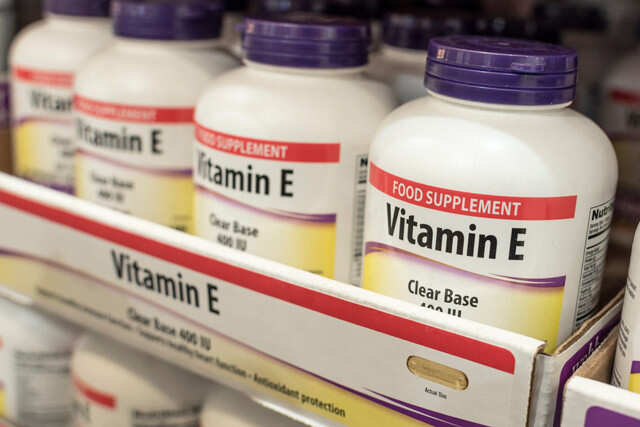
Q. What foods have high vitamin E?
A. Certain oils like canola oil, wheat germ oil and rice bran oil, nuts and seeds, avocado, and spinach, are some of the best sources of vitamin E.
Q. What is the best time to take vitamin E?
A. Vitamin E is best taken in the evenings or at night. Remember to take the supplement with food for maximum absorption.